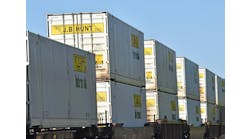The number of new truck broker registrations declined for seven straight months in 2013, according to data from the Federal Motor Carrier Safety Administration. Industry sources cite upcoming government regulations causing a significant barrier for new small brokers to obtain a license to operate.
“I was quite surprised by the data,” said Tim Higham, CEO of Interstate Transport, Inc. “There is often discussion about how government regulation crowds out competition in the brokerage and carrier sector. Here we have the actual data that shows us how small businesses’ growth is directly impacted as the barriers to entry rise.”
Industry experts cite many reasons for the decline in newly licensed brokers, with the latest being the upcoming $75,000 broker bond needed to qualify to obtain a freight broker’s license. Higham stated, “Most bonding companies and insurers are unwilling to take on the risk for a new entrant and therefore require personal guarantees, a bank letter of credit, or posted collateral to secure the necessary bond. A small new entrant just doesn’t have the excess capital on top of the usual start-up costs of a new business.”
Other barriers are making it more difficult to start a new brokerage, as well. Beginning October 1, 2013, a new freight broker must prove that at least one company officer has a minimum of three full years of brokerage experience. Moreover, a generally moribund economy has kept freight volumes relatively low and the spread between freight rates charged to shippers and prices paid to carriers are extremely narrow and declining, making profit margins tighter than ever. This is being felt by small and large brokers alike, with even large, publically-traded brokerages, whose financials are transparent, posting rapidly declining margins as capacity further tightens.
However, Interstate Transport’s Higham also said a good argument can also be made that a temporary rush of new brokerage applications may be seen for the remainder of 2013, but not for any legitimate economic reason. “The new MAP-21 law will force many asset-based carriers to rush to apply for brokerage licenses rather than operate as they do today: accepting a load tender and either placing it on their own truck or brokering the load out. This common business practice is the norm today but the new law states that a ‘carrier operation’ and ‘broker operation’ are two uniquely distinct businesses and must be licensed, operated, and contracted as such. Carriers that choose not to set up distinct brokerage operations face a $10,000 fine per occurrence of non-compliance, which is just too much to risk. So, it is possible that we’ll see a huge, but temporary, inflow of brokerage applications purely to meet the legal requirements effective the first of October.”


